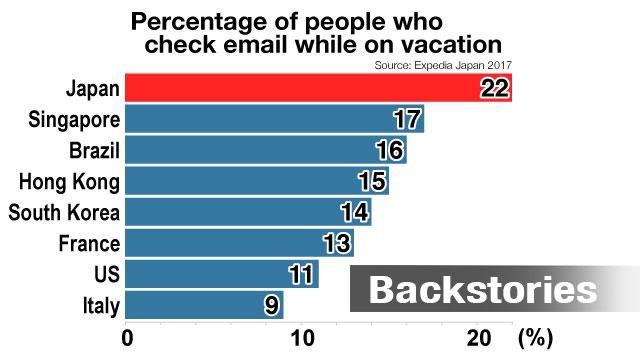Work before vacation
Many Japanese firms have lifetime employment, and this is said to be the reason for the strong sense of loyalty workers feel. Until recently, many in the country saw working endlessly as a virtue. Those who embodied this spirit were called "corporate warriors."
We asked people in Tokyo what they would do if work suddenly came up during their time off.
"Even during a vacation, I'll work if I have to," says a sales representative. "My company hasn't told me to yet but I am willing."
"I check work-related email even when I'm off work," says another man. "I tend to find it more stressful if I find lots of messages in my inbox when I get back."
A young woman: "I put work before vacation because my job means more to me."
Death from overwork has become one of Japan's major social problems and this has led companies to urgently try to reform work culture. This includes drawing the line between work and vacation.
Drawing the line between vacation and work
Japan Airlines, or JAL, one of the country's major carriers, introduced a program last year that keeps track of the hours employees work on vacation and pays them accordingly. Under the system, employees need advance approval from their bosses to work while they're taking time off. This applies even when tasks that require immediate attention come up. They still need to get permission from their bosses.
JAL filed for bankruptcy protection in 2010. Since then, the company has been putting through reforms and encouraging employees to take paid vacation as part of this. But the company says many still hesitate to take long breaks. The new program aims to change this.

28-year-old Anami Onishi translates internal company catalogs for JAL. She applied for 2 weeks of paid leave to go to Italy with her mother, but her new department gave her an assignment that incidentally coincided with the trip. She considered canceling the trip so her colleagues would not have to shoulder the burden, but she opted instead to take advantage of the new program and work from Italy.
She says she spent about 4 hours a day translating before going sightseeing. After the trip, she filed that she had worked 32 hours and was paid for her time, without any fuss.
"I definitely enjoyed it," she says. "I was in Italy. I was still on vacation. And I was able to finish my work. I didn't have any catching up to do when I got back. It was helpful for my colleagues. It was a win-win."
Last year, around 10 people used the program. This year, the figure has already topped 90.
"Some of our employees tend to be distracted by their work if they take time off," says Yoshimasa Higashihara, who oversees the program. "After the introduction of the program, some voiced their suspicion that it was a way to force them to work during their time off. But this view has vanished and it's been a way for them to take long holidays."

Diverse work styles
Professor Shigeru Matsumura of the Tohoku University of Art and Design is studying the use of technology to make work hours more flexible.
"Some people spend an hour a day during vacations to check emails and reply," he says. "They're supposed to be off but end up working. Many of them aren't paid for this because they don't tell their employers."
He adds: "Some people want to take a whole week off without doing anything, while others want to spend about an hour a day to check emails, see how their work is going and how their subordinates are doing in their absence. People in Japan should be given more options for how they work."
In June, Japan's Diet enacted a law aimed at reforming company work culture and it includes a requirement for employees to take paid holidays. Many companies are now discussing how to draw clear lines between work and vacation, in ways similar to JAL. Whether these efforts will allow Japan's vaunted "corporate warriors" to take a rest remains to be seen.

